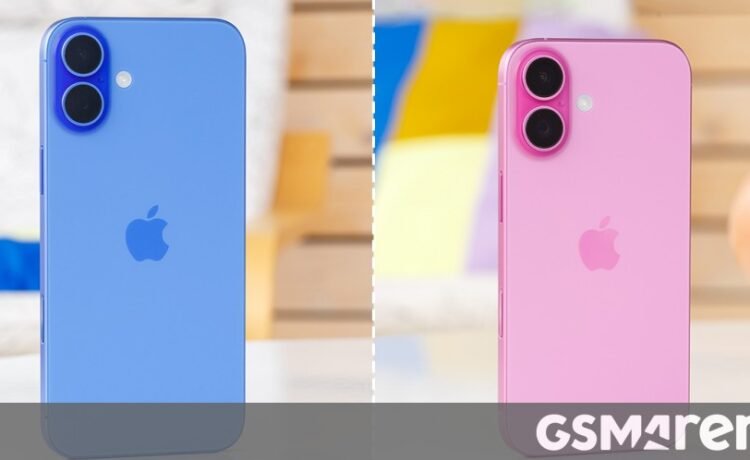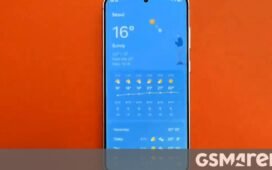So, you’re looking for a shiny new iPhone? The iPhone 16 is certainly a very well-rounded device. Of course, a Pro model will be even better, but unless you really need the extra camera or the high refresh rate, you are probably better off sticking to one of the two vanilla models.
If there is one thing Apple excels at (and it’s definitely more than one thing), it must be consistency. Hence, it is hardly a secret, nor a surprise, that there is very little difference between the iPhone 16 Plus and iPhone 16. The Plus is simply bigger, with a bigger display and a larger battery pack. Otherwise, the hardware and experience are identical.
So how much better is the Apple iPhone 16 Plus to deserve its price premium? Let’s look into it.
Table of Contents:
For starters, you can compare the complete specs sheets or directly continue with our editor’s assessment in the following text.
Size comparison
Let’s address the elephant in the room first – size. The 16 Plus is substantially bigger than the vanilla iPhone 16. The only dimension the two devices share is thickness, which is a nice touch. Other than that, the Plus is taller and wider. Makes sense, given that it has a 6.7-inch display diagonal, compared to 6.1 inches on the iPhone 16.
By today’s standard, we would actually call the Plus the more “mainstream” form factor. Bigger phones have just been the norm for some time now. The Plus feels nice in the hand and is very comfortable to hold, even if a bit slippery without a case.
The regular iPhone 16 is positioned as a “compact” phone. It is very pocketable and extremely easy to handle with one hand. That being said, be sure to go and check out both phones in person. We doubt that you will find the iPhone 16 Plus too big, but you might find the vanilla iPhone 16 a bit too small. That’s just our two cents on the matter.
Display comparison
As mentioned, the iPhone 16 Plus has a significantly larger display than the iPhone 16. Not necessarily large by modern standards, but definitely larger. Technically, the Plus also has a higher display resolution. However, Apple has always aimed for a consistent pixel density across models without caring too much about resolution. This is the case here since both phones have a very crisp 460 ppi.
Apple uses very premium panels, even on its non-Pro devices. Both phones are nice and bright, with very similar brightness figures. OLED technology means perfect blacks, high contrast, and punchy colors. Apple offers HDR10 and Dolby Vision support on both iPhones and has a very flexible HDR implementation, allowing HDR video to play in a window, not just the entire display.
The big issue with the displays of the non-Pro iPhones is the fact that they are still 60Hz. Unfortunately, springing for a Pro model is the only way to get around that.
Battery life
Apple has used the extra internal space inside the iPhone 16 Plus to fit a larger battery. To quote Cupertino’s unnecessarily specific numbers, the iPhone 16 Plus has a 4674 mAh pack, while the regular iPhone 16 gets a 3561 mAh pack.
This translates to roughly 30% difference in battery capacity, which results in a very tangible difference in battery endurance in favor of the iPhone 16 Plus. As per our proprietary testing mechanism, the 16 Plus gets three hours or so of extra Active Use Score.
That being said, the vanilla iPhone 16 still does great in the battery department. It manages very impressive endurance for such a compact phone.
Charging speed
Apple is incredibly consistent when it comes to charging. Both the iPhone 16 and iPhone 16 Plus officially advertise a wired charging rate of around 50% power in thirty minutes, and both phones manage to exceed said rate handily, which is nice to see. While there are slight differences in the charging curves of both phones, as expected, the pair end up getting a full charge in roughly the same total time.
You also get the same charging capabilities on both phones, including wired PD 2.0 charging, 25W wireless MagSafe, 15W wireless Qi2 charging, and 4.5W reverse wired charging.
Speaker test
Cupertino engineers are wizards when it comes to tuning speakers, and they’ve applied an equal level of care and attention to both the iPhone 16 Plus and the iPhone 16. Both phones have a hybrid stereo speaker system with the amplified earpiece acting as the second channel.
Both phones are similarly tuned and achieved a very good loudness score in our testing. Perhaps the Plus is just a hair louder, probably due to having a bit more room to work with, but the difference is insignificant. Quality-wise, both phones are at the same level of excellence.
Performance
Apple made a two-generation chipset jump for the non-Pro iPhones this year, going from the A16 to the A18. That’s a pretty significant boost in power and performance. It is also important to note that, unlike last year, the iPhone 16 models this year all have 8GB of RAM (both the non-Pro and the Pro models).
Apple is making a huge push for AI, which stands for Apple Intelligence in this particular case. Presumably, Cupertino engineers need the extra RAM to run local AI models better, and the fact that this consideration has reached non-Pro iPhones makes us pretty happy because it should help in the daily use of the phones too.
Benchmark performance
Naturally, since the iPhone 16 Plus and iPhone 16 use the same Apple A18 chip, it only makes sense that they would have the same peak burst performance. The benchmark scores paint exactly that picture.
That being said, it is perhaps worth noting that presumably due to its bigger size, the iPhone 16 Plus handles thermal-throttling a bit better than the iPhone 16. It loses a bit less of its performance after a prolonged stress test. Still, the difference between the two is not major, and no real-world apps or games will stress the hardware in such a manner, making this sort of a scientific point of interest rather than a practical one.
Camera comparison
The iPhone 16 Plus and iPhone 16 have the exact same camera setup. Yet another point of consistency. The main 48MP camera is borrowed from the iPhone 15. It is quite potent still, with a 1/1.56″ size, 1.0µm individual pixels and sensor-shift OIS. There is a bright f/1.6 lens in front of it.
The selfie is borrowed from the iPhone 15 as well. The 12MP shooter has already proven its salt and is equipped with phase detection autofocus as well.
The real upgrade is with the new ultrawide camera. It is still a 12MP unit. However, this year, there is a brighter lens with an f/2.2 aperture. Plus, probably best of all, there is now phase detection autofocus on the ultrawide, which allows it to double as a macro camera for close-ups.
A few words on the new Camera Control button. It’s a physical button with actual travel, but it also integrates a high-precision force sensor that enables the light press gesture and a capacitive sensor that allows for touch and swipe interactions. The button is present on both the iPhone 16 Plus and the iPhone 16 and enables the same features within the camera app – mainly quick controls through gestures. The two-stage shutter functionality is coming with a future update.
Image quality
We are looking at two phones with identical camera hardware, identical chipsets and ISPs and identical processing. Hence, the shots are identical as well. You can check out the samples for yourself. The iPhone 16 Plus and iPhone 16 capture excellent 12MP stills. There is no question about it. The frame has plenty of detail, and everything is clean and sharp. Dynamic range is excellent, and shadows, in particular, are nicely boosted and developed. Foliage and grass look very convincing.




Apple iPhone 16 Plus: ultrawide • main • 2x • portrait




Apple iPhone 16: ultrawide • main • 2x • portrait
The low-light performance is also identical across the two phones. Shocking, we know.



Apple iPhone 16 Plus: ultrawide • main • 2x



Apple iPhone 16: ultrawide • main • 2x
Autofocus is great on both phones’ selfie cameras. The quality is great.
Video quality
All in all, the iPhone 16 Plus and iPhone 16 live up to Apple’s reputation for industry-leading video capture. The main cameras on both phones output clean, sharp videos with a wide dynamic range and plenty of details, even in the shadows.
Below we have a few framegrabs from the videos taken by the two phones at each focal length so it’s easier to compare to one another.




Apple iPhone 16 Plus: ultrawide • main • 2x • low-light




Apple iPhone 16: ultrawide • main • 2x • low-light
Verdict
Apple is nothing if not consistent with its lineup. Do you want a compact phone without spending too much? Get the vanilla iPhone 16. Could you make that a bit bigger, please? Sure, there’s the iPhone 16 Plus. The same exact phone, just bigger. Simple and straight forward.
Either way, you are getting an excellent premium phone. Sure, we would have loved to see a high refresh rate finally come to non-Pro iPhones and that Apple telephoto camera is looking just as cool as ever, if not cooler. Still, if you don’t need either of those things, you can’t go wrong with an iPhone 16 Plus or iPhone 16.






















